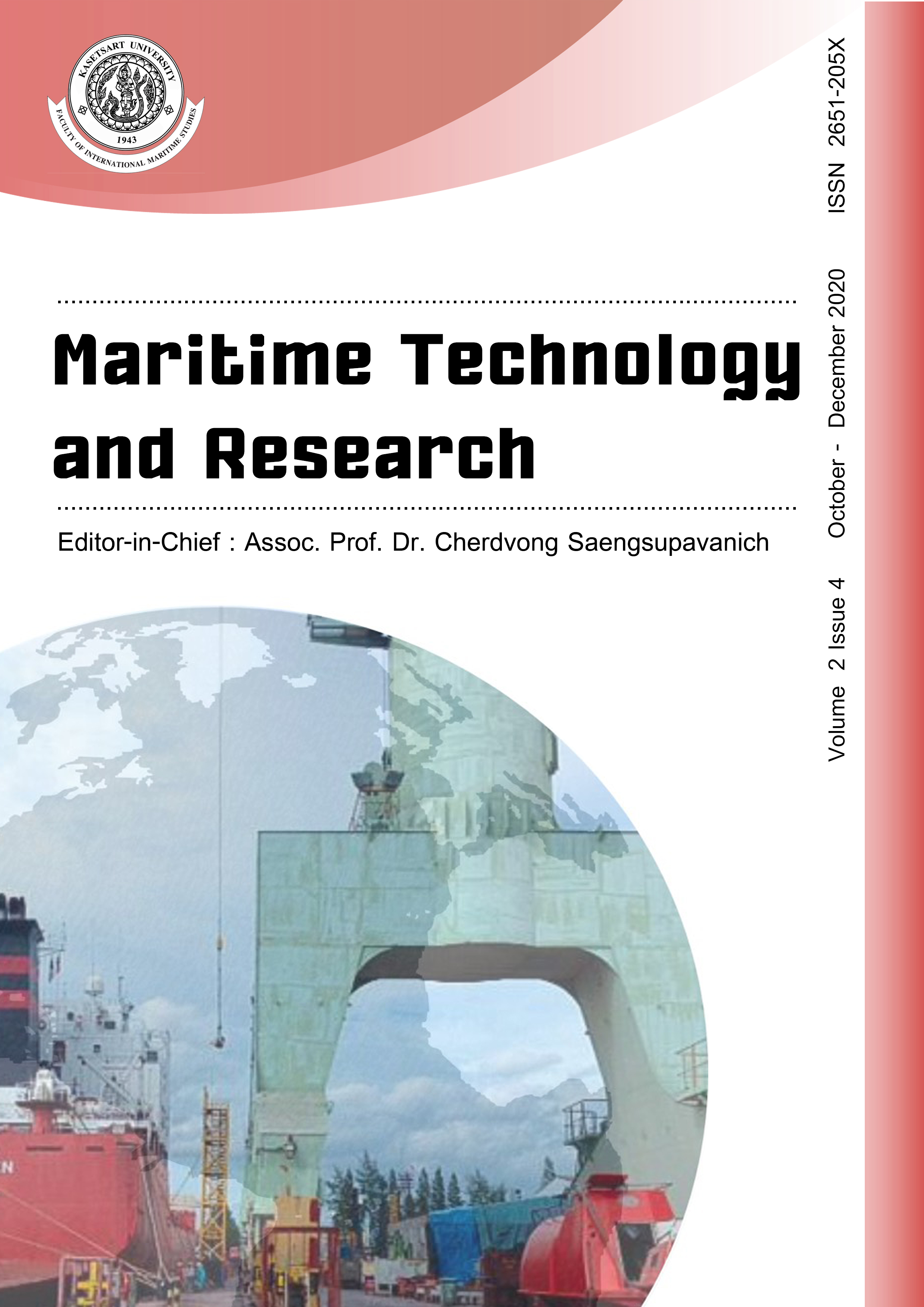Challenges in the integration of Data Management Systems (DMS) in ship operations
DOI:
https://doi.org/10.33175/mtr.2020.237060Keywords:
Data Management Systems (DMS), Ship operations, Process technology, Maritime, SoftwareAbstract
While the rapid growth of emerging technologies is changing the practices of industries worldwide, the global maritime industry has been conservative and reluctant to make any significant changes in their management practice. Data Management Systems (DMS) have become increasingly important in many other industries, such as banking and finance, health care, shopping, and different educational institutions, including universities, academic institutions, and journals. However, ship managers have not adopted and integrated DMS to a similar extent in ship operations. The related reasons may include inadequate knowledge, prevailing management practices, a lack of incentives, and high capital expenditure (CAPEX). In this research, 5 key hypotheses were developed based on existing knowledge and scholarship, drawn from a variety of sources in both the public domain and private databases. Primary data was gathered through semi-structured interviews and online questionnaires to test these hypotheses. This article identifies and critically examines some key issues of DMS with respect to ship operations and how it can be used in ship operations to improve management efficiency. DMS currently marketed does not address the industry’s requirements, hence, it should be customised to suit the industry’s needs by asking vessel managers for their requirements rather than DMS writers assuming them. Training in DMS software is a weak point and, hence, needs more attention. DMS packages should be made more user / operator friendly and intuitive by paying more attention to the UDI to minimise training requirements and barriers to acceptance. Finally, this paper concludes by introducing some recommendations and proposing a model framework for the integration of DMS in ship operations.
References
Addotenkorang, R., & Helo, P. (2016). Big data applications in operations/supply-chain management. Computers and Industrial Engineering, 101, 528-543. doi:10.1016/j.cie.2016.09.023
Ahmed, E., Yaqoob, I., Hashem, I. A. T., Khan, I., Ahmed, A. I. A., Imran, M., & Vasilakos, A. V. (2017). The role of big data analytics in Internet of Things. Computer Networks, 129(2), 459-471. doi:10.1016/j.comnet.2017.06.013
Bakhsh, N. (2018). Vale expects drop in freight costs with new VLOCs installed with scrubbers. Lloyd’s List Maritime Intelligence Informa, UK.
Balmat, J., Lafont, F., Maifret, R., & Pessel, N. (2011). A decision-making system to maritime risk assessment. Ocean Engineering, 38(1), 171-176. doi:10.1016/j.oceaneng.2010.10.012
Bhardwaj, S. (2013). Challenges and potential of technology integration in modern ship management practices. ProQuest Dissertations Publishing, USA.
Boone, C. A., Skipper, J. B., & Hazen, B. T. (2017). A framework for investigating the role of big data in service parts management. Journal of Cleaner Production, 153, 687-691. doi:10.1007/s10479-016-2314-1
Branch, A. E. (2014). Branch’s elements of shipping. 9th ed. Alan Edward Branch and Michael Robarts. London: Routledge.
Copernicus. (2016). Copernicus, Europe’s eye on earth. Retrieved from http://www.copernicus.eu/main/overview
Corbin, J., & Strauss, A. (2008). Basics of qualitative research: Techniques and procedures for developing grounded theory. Thousand Oaks CA: Sage publications.
DNV GL. (2017). Reap the benefits of maritime data. Retrieved from https://www.dnvgl.com/maritime/digital-transformation/index.html
Drewry, M. R. (2017). Ship operating costs annual review and forecast: Annual report. 2017/2018 ed. London: Drewry Maritime Research.
Efficient Sea. (2009). Efficient, safe and sustainable traffic at sea . Retrieved from http://www.efficiensea.org/default.asp?Action=Details&Item=403
EMSA. (2017a). LRIT cooperative data centre. Retrieved from http://www.emsa.europa.eu/component/flexicontent/117.html?Itemid=118
EMSA. (2017b). Vessel traffic monitoring in EU waters (SafeSeaNet). Retrieved from http://www.emsa.europa.eu/ssn-main.html
Ernst & Young LLP. (2017). Better-working insurance: Moving blockchain from concept to reality. Guardtime. Retrieved from https://www.ey.com/Publication/vwLUAssets/ey-blockchain-pov-from-potential-to-actual-value/$File/ey-marine-blockchain-pov-final.pdf
EUGDPR. (2016). EU general data protection regulation. Retrieved from https://www.eugdpr.org/eugdpr.org-1.html
Fields, C. (2015). “Smart ships” heading for port. Allianz Global Risk Dialogue, 1, 10-13.
IGGI. (2005). The principles of good data management. 2nd ed. Office of the Deputy Prime Minister: London.
Ilyina, T. (2006). Organising a global ocean observing system. In: Peter, E., & Rainer, L. (Eds.). International maritime organisations and their contribution towards a sustainable marine development. Hamburg: LIT Verlag, pp. 181-196.
IMO. (2003). Issues to be considered when introducing new technology on board ship . London: IMO. Retrieved from http://solasv.mcga.gov.uk/msc/MSC%20CIRC%201091.pdf
IMO. (2014a). ISM code: International safety management code with guidelines for its implementation. 2014 ed. London: IMO.
IMO. (2014b). SOLAS consolidated edition 2014: Consolidated text of the international convention for the Safety of Life at Sea, 1974, and its protocol of 1988. London: IMO.
IMO. (2015). Energy management plan and system. Retrieved from http://www.imo.org/en/OurWork/Environment/PollutionPrevention/AirPollution/Documents/Air%20pollution/M6%20TTT%20course%20Posters%20final1.pdf#search=data%20management%20systems
IMO. (2017). Guidelines on maritime cyber risk management. London: IMO. Retrieved from http://www.imo.org/en/OurWork/Security/Guide_to_Maritime_Security/Documents/MSC-FAL.1-Circ.3%20-%20Guidelines%20On%20Maritime%20Cyber%20 Risk%20Management%20(Secretariat).pdf#search=data%20management%20systems
Januszewska, J. (2012). The benefits of cloud computing in the maritime transport. International Conference on Transport Systems Telematics, 329, 258-266. doi:10.1007/978-3-642-34050-5_29
Jiang, D. (2017). Indeterminacy, capital maintenance expenditures and the business cycle. Economic Modelling, 61, 432-438. doi: 10.1016/j.econmod.2016.11.008
Kalyvas, C., Kokkos, A., & Tzouramanis, T. (2017). A survey of official online sources of high-quality free-of-charge geospatial data for maritime geographic information systems applications. Information Systems, 65, 36-51. doi:10.1016/j.is.2016.11.002
Lazakis, I., Dikis, K., Michala, A. L., & Theotokatos, G. (2016). Advanced ship systems condition monitoring for enhanced inspection, maintenance and decision making in ship operations. Transportation Research Procedia, 14, 1679-1688. doi:10.1016/j.trpro.2016.05.133
Lowry, N. (2018). Crowded market dents profits at Capital Product Partners. Lloyd’s List Maritime Intelligence Informa, UK.
Magnus, S. (2010). Increased focus on safety of navigation. Retrieved from http://www.sjofartsverket.se/en/MonaLisa/MONALISA-20
Montewka, J., Goerlandt, F., Innes-Jones, G., Owen, D., Hifi, Y., & Puisa, R. (2017). Enhancing human performance in ship operations by modifying global design factors at the design stage. Reliability Engineering & System Safety, 159, 283-300. doi:10.1016/j.ress.2016.11.009
NSR. (2009). Safety at sea, North Sea region programme. Retrieved from http://archive.northsearegion.eu/iiib/projectpresentation/details/&tid=34&theme=2
Peng, P., Yang, Y., Cheng, S., Mou, N., & Yang, R. (2018). Modelling the competitiveness of the ports along the Maritime Silk Road with big data. Transportation Research Part A - Policy and Practice, 118, 852-867. doi:10.1016/j.tra.2018.10.041
Porter, J. (2016). Maersk’s digital drive puts customers centre stage. Lloyd’s List Maritime Intelligence Informa, UK.
Porter, J. (2017). Maersk presses ahead with digitalisation plans after malware attack. Lloyd’s List Maritime Intelligence Informa, UK.
Reed Smith LLP. (2018). Blockchain: Distributed ledger technology and designing the future. London: Reed Smith LLP.
Reuters. (2015). Baltic index continues to fall on poor vessel demand. Retrieved from https://af.reuters.com/article/energyOilNews/idAFL8N13W2UX20151207
Saunders, M., Lewis, P., & Thornhill, A. (2016). Research methods for business students. 7th ed. Harlow: Pearson.
Sivarajah, U., Kamal, M. M., Irani, Z., & Weerakkody, V. (2017). Critical analysis of big data challenges and analytical methods. Journal of Business Research, 70, 263-286. doi:10.1016/j.jbusres.2016.08.001
Slack, N. (2016). Operations management. 8th ed. Harlow: Pearson, pp. 532-568.
Stopford, M. (2009). Maritime economics. 3rd ed. London, Routledge.
StormGeo. (2017). Newsroom StormGeo’s news and press releases. Retrieved from http://www.stormgeo.com/newsroom
Thurston, T., & Hu, H. (2002). Distributed agent architecture for port automation. In: Proceedings of the Computer Software and Applications Conference (pp. 81-90). Oxford, UK. doi:10.1109/CMPSAC.2002.1044537
Tian, Z., Liu, F., Li, Z., Malekian, R., & Xie, Y. (2017). The development of key technologies in applications of vessels connected to the internet. Symmetry, 9(10), 211. doi:10.3390/sym9100211
UNCTAD. (2017). Review of maritime transport 2017. New York & Geneva: United Nations Publication. Retrieved from http://unctad.org/en/PublicationsLibrary/rmt2017_en.pdf
UNCTAD. (2019). Review of maritime transport 2019. New York & Geneva: United Nations Publication. Retrieved from https://unctad.org/en/PublicationsLibrary/rmt2019_en.pdf
Wilhelmsson, J. (2015). Ship efficiency: Enabling big data: Fathom maritime intelligence. Webinar. Retrieved from https://www.youtube.com/watch?v=-5-NfRJG0n8
Zaman, I., Pazouki, K., Norman, R., Younessi, S., & Coleman, S. (2017). Challenges and opportunities of big data analytics for upcoming regulations and future transformation of the shipping industry. Procedia Engineering, 194, 537-544. doi:10.1016/j.proeng.2017.08.182
Downloads
Published
Issue
Section
License
Copyright: CC BY-NC-ND 4.0








